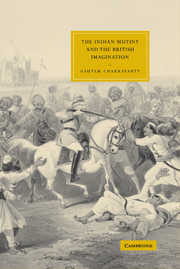Book contents
- Frontmatter
- Contents
- Acknowledgements
- Glossary
- Introduction
- 1 From chronicle to history
- 2 Reform and revision
- 3 Romances of empire, Romantic orientalism and Anglo-India: contexts, historical and literary
- 4 The ‘Mutiny’ novel and the historical archive
- 5 Counter-insurgency and heroism
- 6 Imagining resistance
- Epilogue
- Notes
- Bibliography
- Index list
- CAMBRIDGE STUDIES IN NINETEENTH-CENTURY LITERATURE AND CULTURE
Introduction
Published online by Cambridge University Press: 22 September 2009
- Frontmatter
- Contents
- Acknowledgements
- Glossary
- Introduction
- 1 From chronicle to history
- 2 Reform and revision
- 3 Romances of empire, Romantic orientalism and Anglo-India: contexts, historical and literary
- 4 The ‘Mutiny’ novel and the historical archive
- 5 Counter-insurgency and heroism
- 6 Imagining resistance
- Epilogue
- Notes
- Bibliography
- Index list
- CAMBRIDGE STUDIES IN NINETEENTH-CENTURY LITERATURE AND CULTURE
Summary
In ‘The Indian Mutiny in Fiction’, a review article that appeared in Blackwood's Edinburgh Magazine in 1897, Hilda Gregg made an observation that bears recall. At the start of her survey of recent novels on the subject Gregg noted that: ‘Of all the great events of this century, as they are reflected in fiction, the Indian Mutiny has taken the firmest hold on the popular imagination.’ Gregg does not quite explain her meaning, but as this book hopes to show, the imagination that seized on the rebellion of 1857–9 was the vulgate of late-nineteenth century British expansionism. The literary yield of the rebellion, as indeed the event itself, loses much of its meaning when not read alongside the many foreign and colonial conflicts of the century which provided material for fiction: from the momentous Napoleonic wars through the cycle of warfare in India as in other colonial and para-colonial possessions from the mid-eighteenth century to the Crimean and the Boer Wars. Militarily, the nineteenth century was perhaps the busiest period in British history, laying the basic groundwork for the geo-political configurations which some have called the ‘world-system’, and for the legal and constitutional bases of sovereignty and intervention. The need to open markets, protect commercial interests, enforce tariffs, contain European and coerce extra-European powers continuously provided reasons for armed conflict.
- Type
- Chapter
- Information
- The Indian Mutiny and the British Imagination , pp. 1 - 18Publisher: Cambridge University PressPrint publication year: 2005

